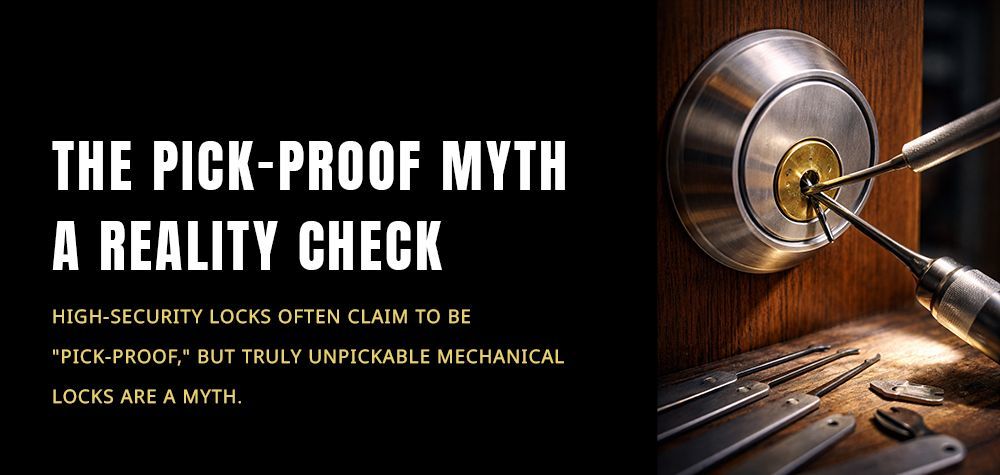The Difference Between Tamper-Proof and Pick-Resistant Locks
When it comes to protecting your home, office, or vehicle, not all locks are created equal. You’ve probably seen terms like tamper-proof and pick-resistant tossed around by locksmiths and manufacturers — but what do they really mean? Although both suggest enhanced protection, the difference between them lies in the type of threat they’re designed to stop. Understanding that distinction can help you make the right security choice for your property.
Can a Locksmith Recover a Lost Digital Lock Passcode?
What Does “Pick-Resistant” Really Mean?
A pick-resistant lock is designed to make it difficult for intruders to manipulate the internal mechanisms of the lock — specifically, the pins — using tools like lock picks or tension wrenches. Traditional locks have simple pin-and-tumbler mechanisms that can be picked by applying pressure and aligning pins in a specific order. Skilled thieves can sometimes open these without keys in seconds.
Pick-resistant locks counter this by using complex pin configurations, spool pins, or mushroom pins that make it far harder to feel or align the pins correctly. Some high-security locks even add rotating discs or magnetic systems that render standard lock-picking tools useless.
While “pick-proof” locks don’t technically exist (given enough time and skill, most locks can eventually be picked), pick-resistant locks drastically reduce the odds of a successful intrusion. They act as a strong deterrent — forcing burglars to spend more time and risk getting caught.
Understanding Tamper-Proof Locks
Tamper-proof locks take protection a step further. Instead of focusing solely on the internal mechanism, they’re designed to resist external manipulation or forced entry. These locks are built to withstand brute-force attacks like drilling, prying, hammering, or even using bump keys (a common burglar tool).
Their designs often feature hardened steel components, reinforced strike plates, anti-drill pins, and shrouded shackles that make it physically harder for tools to reach or damage the lock. Tamper-proof locks are frequently used in commercial properties, high-security facilities, and vehicles — anywhere that physical attacks on locks are a concern.
Essentially, while pick-resistant locks defend against subtle manipulation, tamper-proof locks defend against aggressive attacks.
The Key Differences Between Tamper-Proof and Pick-Resistant Locks
At first glance, both types might sound like they serve the same purpose — keeping intruders out. However, the distinction lies in how they provide protection.
- Pick-resistant locks are designed to resist finesse attacks — attempts to “feel” the pins and unlock without a key.
- Tamper-proof locks are engineered to withstand brute-force attacks and mechanical tampering.
A pick-resistant lock uses complex pin structures to confuse lock-picking tools, while a tamper-proof lock employs physical reinforcements and anti-drill barriers. Together, they cover two very different security vulnerabilities.
Why Both Types Matter in Modern Security
In the modern world, burglars use both traditional lock-picking and more aggressive methods. That’s why relying on only one type of protection isn’t always enough. For instance, if your lock is pick-resistant but not tamper-proof, a thief could still break it open using a drill or hammer. Similarly, if your lock is tamper-proof but easy to pick, a patient intruder could still bypass it quietly.
For complete protection, locksmiths often recommend combining both features. High-quality locks from reputable brands are now built with multi-layer security, offering resistance to picking, drilling, and bumping — all in one system.
Why Multi-Factor Authentication Is Coming to Home Locks
How Locksmiths Enhance Your Lock Security
When you contact a professional locksmith like Brothers Locksmith, they can assess your property’s vulnerabilities and recommend the right balance between tamper resistance and pick resistance. For example, residential clients might benefit from smart deadbolts with anti-pick pins, while commercial spaces may need heavy-duty tamper-proof mechanisms for entry points and storage rooms.
Locksmiths can also reinforce existing locks with anti-drill plates, replace weak cylinders, or upgrade to electronic access systems that eliminate the need for physical keys altogether. In some cases, rekeying your lock to a high-security cylinder can instantly enhance both tamper and pick resistance without replacing the entire door hardware.
When to Upgrade Your Locks
If you notice that your locks are older, stiff, or beginning to show signs of wear, it’s time to consider upgrading. Over time, standard locks lose their precision, making them easier to manipulate or force open. Upgrading to a lock system with both tamper-proof and pick-resistant features gives you peace of mind — knowing that your home or business has layers of protection against multiple threats.
It’s also wise to upgrade if you’ve recently moved into a new place or experienced a break-in attempt. Even if no visible damage occurred, a locksmith inspection can ensure your locks haven’t been compromised.
Choosing the Right Lock for Your Needs
When selecting a new lock, think about your specific environment:
- Homes: Pick-resistant deadbolts with anti-drill pins provide strong everyday protection.
- Businesses: Tamper-proof locks with reinforced housings deter forced entries.
- Apartments: Hybrid smart locks offer pick resistance plus digital access control.
Consulting a locksmith ensures you don’t just buy a lock that sounds good on paper — but one that truly fits your security needs and budget.
Final Thoughts
While tamper-proof and pick-resistant locks might sound like marketing buzzwords, they represent two crucial aspects of modern security: defense against precision attacks and brute force. Understanding the difference helps you choose the right level of protection for your property.
Whether you’re safeguarding a home, office, or vehicle, the key lies in combining technologies and professional insight. With expert help from Brothers Locksmith, you can ensure that your locks aren’t just strong — they’re smartly designed to stand up to every kind of threat.
Call Us Any Time!







